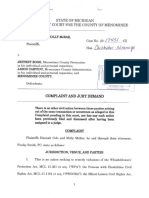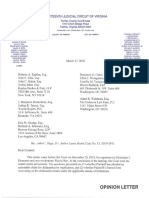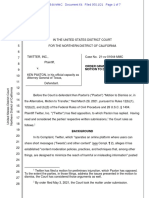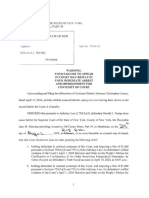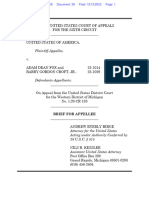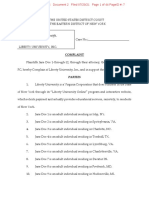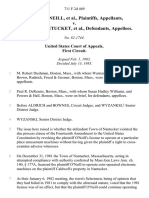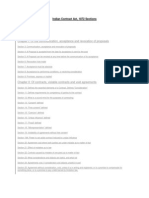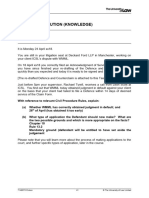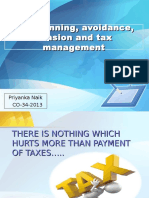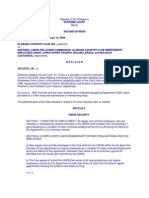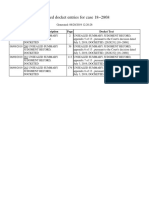Documents: Case vs. Fletcher Dismissed
Uploaded by
Pat MuellerDocuments: Case vs. Fletcher Dismissed
Uploaded by
Pat MuellerSUPERIOR COURT OF CALIFORNIA
COUNTY OF SAN DIEGO
CENTRAL COURTHOUSE
TENTATIVE RULINGS - August 07, 2025
HEARING DATE: 8/8/25 HEARING TIME: 9:00am DEPT.: 60
JUDICIAL OFFICER:
CASE NO.:37-2023-00012828-CU-OE-CTL
CASE TITLE: Figueroa vs Fletcher [IMAGED]
CASE TYPE: (U)Other Employment
HEARING TYPE:
Defendants San Diego Metropolitan Transit System and Nathan Fletcher’s joint motion for terminating
sanctions is GRANTED.
Although the specific request for a terminating sanction is granted, the court will not award monetary
sanctions.
Background
Plaintiff Grecia Figueroa filed this case on March 28, 2023. Before filing, one of her former attorneys,
Zachary Schumacher, sent Defendant Fletcher a demand for employment records and a demand for
preservation of records on February 17, 2023. (Defendants’ Lodgment, Ex. 1.)
Defendant Fletcher then issued a Preservation of Evidence Letter to Plaintiff on April 6, 2023 and
Defendant MTS issue one on April 14, 2023. (Defendants’ Lodgment, Exs. 33.) After these letters
were exchanged, extensive and contentious discovery disputes ensued.
Plaintiff’s Discovery Misconduct
Plaintiff’s Destruction of the May 12, 2022 Voice Recording to Defendant Fletcher
Defendant Fletcher served his first requests for production of documents on Plaintiff on June 20,
2023, which sought all communications, including voice recordings, between Plaintiff and Defendant
Fletcher. (Defendants’ Lodgment, Ex. 4.) Plaintiff served verified responses on July 24, 2023,
attesting she would comply with the request and produce responsive documents in her possession.
(Defendants’ Lodgment, Ex. 5.) However, Plaintiff did not produce any audio files between herself
and Defendant Fletcher, prompting Defendant Fletcher to bring a motion to compel, which was
granted on October 27, 2023. (Defendants’ Lodgment, Ex. 6.) Plaintiff and her former counsel (The
Pride Law Firm) were sanctioned, and Plaintiff was ordered to produce all communications and all
voice recordings between herself and Defendant Fletcher no later than close of business on
November 30, 2023. (ROA 110.) But Plaintiff never produced the requested audio files, and a recent
forensic examination of Plaintiff’s phone confirmed any such voice notes cannot be recovered. (ROA
638, Mulvaney Dec., ¶ 1; ROA 641, Kunkel Dec., ¶ 10.)
TENTATIVE RULING Page 1 of 6
CASE NUMBER: 37-2023-00012828-CU-OE-CTL
CASE TITLE: Figueroa vs Fletcher [IMAGED]
Before filing this case, Plaintiff made a screen recording using her phone of all the messages
between herself and Defendant Fletcher. (Defendants’ Lodgment, Ex. 3 [Plaintiff’s Depo. Transcript],
at p. 276:7-15.) That screen recording shows the existence of a 23-second audio recording Plaintiff
sent to Defendant Fletcher on May 12, 2022, which he contends was an erotic message
demonstrating Plaintiff’s consent to their interactions. (ROA 639, Fletcher Dec., ¶ 2; Defendants’
Lodgment, Ex. 7.) Plaintiff confirmed in her July 24, 2023 discovery responses she would produce all
voice recordings in her possession; thus, it is reasonable to infer the audio file existed as of this date,
and was not produced. (Defendants’ Lodgment, Ex. 5; Mulvaney Dec., ¶ 1.) Defendant Fletcher later
requested Plaintiff produce the May 12, 2022 audio file shown in the screen recording, and then in
May 2024 moved to compel a response from Plaintiff to that specific request. (Defendants’ Lodgment,
Ex. 8; ROA 302-306.) It was not until October 7, 2024, that Plaintiff served an amended response
indicating the recording no longer exists, as it had been “unsent.” (Defendants’ Lodgment, Ex. 9, at p.
7.)
Defendant Fletcher also served a Request for Admission regarding the May 12, 2022 audio file, and
Plaintiff responded on March 20, 2024, admitting the message had been unsent. (Defendants’
Lodgment, Exs. 10-11.) Then on March 28, 2024, Plaintiff confirmed to the court she had deleted the
message. (Defendants’ Lodgment, Ex. 12, at p. 13:4-10 [“Another thing that I would like to add is that
they are saying that I deleted one message, but I was sent a preservation of evidence letter about a
week after that even happened.”].) Plaintiff confirmed at her deposition the audio file existed on her
phone at the time she made the screen recording of the messages, that she was telling Defendant
Fletcher how to pronounce the word “papacito” in the audio message, and that she had unsent it
because “I didn’t like how my voice sounded, so I unsent it.” (Defendants’ Lodgment, Ex. 13, at p.
623:1-12, 624:14-25.)
Plaintiff’s Failure to Produce Relevant Text Messages Between Herself and Danielle Radin
Defendant Fletcher served a second set of Requests for Production of Documents on August 17,
2023, which sought all communications between Plaintiff and anyone other than her attorneys that
related to Defendant Fletcher. (Defendants’ Lodgment, Ex. 18.) Plaintiff served responses to the
requests on October 4, 2023, and agreed to produce all responsive non-privileged documents in her
possession. (Defendants’ Lodgment, Ex. 19.) However, Plaintiff failed to produce hundreds of
messages about Defendant Fletcher she exchanged with her close friend, Danielle Radin. (Mulvaney
Dec., ¶ 3.) Defendant Fletcher confirmed the messages were missing by comparing Plaintiff’s
production with a partial production Ms. Radin, and concluded Plaintiff had produced only a curated
selection of communications. (Id. [“Plaintiff failed to produce communications between herself and
Ms. Radin from 12/24/21, 1/28/22, 2/16/22, 2/28/22, 3/7/22, 3/8/22, 3/10/22, 3/11/22, 4/7/22, 4/14/22,
4/25/22, 5/5/22, 5/16/22, 5/17/22, 5/19/22, 5/20/22, 5/26/22, 6/6/22, 6/12/22, 6/13/22, 6/26/22,
7/13/22, 7/14/22, 7/16/22, 7/21/22, 7/31/22, 9/2/22, 11/21/22. Plaintiff has not produced any
messages between herself and Ms. Radin between March/April of 2023 through March/April of
2024.”])
On February 14, 2025, Plaintiff produced an additional 434 pages of text messages between herself
and Ms. Radin, without providing an explanation for the delay in producing them. (Mulvaney Dec. ¶
14.) Moreover, following extensive meet and confer efforts, motions to compel, and forensic
examinations of Plaintiff’s phone and Ms. Radin’s phone, Defendant Fletcher has confirmed that no
messages between Plaintiff and Ms. Radin for the period of January 2023 through March 23, 2023,
have been produced or recovered, and that no messages between the two prior to March 27, 2023,
are recoverable. (Kunkel Dec. ¶ 8.)
TENTATIVE RULING Page 2 of 6
CASE NUMBER: 37-2023-00012828-CU-OE-CTL
CASE TITLE: Figueroa vs Fletcher [IMAGED]
Plaintiff Selectively Deleted Messages Before Producing Them
First, a comparison of the screen recording of Plaintiff’s direct messages with Defendant Fletcher to
the download of their chat history (produced by Plaintiff and dated February 16, 2023) reveals that
Plaintiff selectively deleted certain messages before making the screen recording. For example, the
downloaded chat history contains the message from Plaintiff: “Con ‘ganas de comerte,’” which is a
sexually charged phrase directly translated as “wanting to eat you,” and responded to Defendant
Fletcher asking her how she is on December 8, 2022. (Defendant’s Lodgment, Ex. 14.) This message
is absent from the screen recorded version of those messages created by Plaintiff in March 2023.
(Defendant’s Lodgment, Ex. 15.) The only reasonable inference to draw from this comparison is that
Plaintiff deleted it from the chat history between February 2023 and March 2023. Similarly, Plaintiff
must have also deleted a message from herself to Defendant Fletcher on December 31, 2022, in
which she initiated the communication by saying, “Happy birthday, Campeón,” as that message is
also absent from the March 2023 screen capture. (Defendant’s Lodgment, Exs. 16-17.)
Second, a comparison of the document productions made by Plaintiff, compared to the same
messages produced by Ms. Radin, reveals that Plaintiff altered at least four communications before
producing them in this case. The first is a comparison of FIGUEROA-00080 with the same message
produced by Ms. Radin. (Defendant’s Lodgment, Ex. 22, at pp. 5-6.) That exchange shows that, in
Plaintiff’s production, she deleted or omitted a message from Ms. Radin to Plaintiff saying, “You’re not
a hoe you [sic] didn’t even do anything lol [sic],” which was in response to the deleted or omitted
message from Plaintiff stating, “This is my fault. For being a lil hoe…For being a fucken lil hoe.” (Id.)
The second is a message missing from Plaintiff’s production in which she tells Ms. Radin, “I have
receipts.” (Defendant’s Lodgment, Ex. 22, at pp. 7-8.) The third message (FIGUEROA – 00082) is
from Ms. Radin to Plaintiff, in which she states, “You had a crush on him for years, it was exciting to
have some flirtation, you got validation that it wasn’t all in your head he felt it too, it was exciting, like
there was a time…” (Id.) Finally, Plaintiff also deleted or omitted her “heart” reaction to the message
from Ms. Radin regarding Plaintiff’s crush on Defendant Fletcher.
After Filing Her Lawsuit, Plaintiff Knowingly Allowed Her Messages to Be Auto-Deleted
In a declaration dated October 29, 2024, Plaintiff admitted she had auto-delete enabled on her phone.
(Defendant’s Lodgment, Ex. 24, at ¶ 6.) She also admitted that when she searched for relevant
documents in this case in May 2023, she was only looking for text messages that “reflected how
Defendant Fletcher’s actions impacted my mental state, which I found in some message exchanges
between myself and Ms. Danielle Radin.” (Id. at ¶ 7.) Plaintiff was necessarily aware in May 2023 that
auto-delete was enabled on her phone, because she “no longer had access to messages with Ms.
Radin prior to May 2022, as my phone’s settings had automatically cleared them after one year.”
(Defendant’s Lodgment, Ex. 24, at ¶ 7.) But Plaintiff nonetheless knowingly kept the auto-delete
function enabled on her phone, and did not disable it until March or April of 2024. (Defendant’s
Lodgment, Ex. 13, at pp. 338:2-25, 339:1-5, 350:11-25, 351:1-3.)
After Filing Her Lawsuit, Plaintiff Deleted Audio Files She Exchanged with Ms. Radin
Defendant Fletcher propounded a fifth set of Requests for Production to Plaintiff on August 8, 2024,
which included requests for three specific audio messages contained in the screenshotted messages
between Plaintiff and Ms. Radin. (Defendant’s Lodgment, Ex. 25.) On September 9, 2024, Plaintiff
TENTATIVE RULING Page 3 of 6
CASE NUMBER: 37-2023-00012828-CU-OE-CTL
CASE TITLE: Figueroa vs Fletcher [IMAGED]
responded by stating she does not have the requested files in her possession, custody, or control.
(Defendant’s Lodgment, Ex. 26, at pp. 11:13-28, 12:1.)
During her deposition, Plaintiff confirmed the April 7, 2022 audio file, which was 30 seconds long, was
about Defendant Fletcher and had been deleted. (Defendant’s Lodgment, Ex. 13, at pp. 636:18-25;
637:1- 25; 638:1-17.) Plaintiff also confirmed the two audio files from May 12, 2022 (a 40 second file
and a 4 second file) were directly relevant to her interactions with Defendant Fletcher and that they
were not in her possession. (Id. at pp. 638:18-25; 639:1-11, 20-21.) Ms. Radin also has indicated she
does not have those files in her possession, and because her phone was stolen in 2024, those
messages cannot be recovered. (Defendant’s Lodgment, Ex. 21.) A forensic examination of Plaintiff’s
phone has now confirmed no voice memos prior to 2023 can be recovered from Plaintiff’s phone.
(Kunkel Dec., ¶ 10.)
Plaintiff Engaged in a Pattern of Discovery Obstruction and Delay
On February 7, 2024, Defendant Fletcher served a third set of Requests for Production on Plaintiff,
which specifically sought the full chat history that Plaintiff claimed to have downloaded in her text
message to Ms. Radin dated September 1, 2022. (Defendant’s Lodgment, Ex. 8.) Defendant Fletcher
was forced bring a motion to compel (ROA 261-265), which was never heard because Plaintiff
provided supplemental responses on October 7, 2024, prior to the October 18, 2024 hearing date.
(Defendant’s Lodgment, Ex. 9.) Plaintiff then served a second supplemental response on November
1, 2024, in which Plaintiff represented she would produce all documents in her possession, custody,
or control. (Defendant’s Lodgment, Ex. 27.) Thus, despite having the complete download of the
messages in her possession since September 2022, Plaintiff delayed until November 1, 2024 to
produce the download, and only after a motion to compel was filed. (Mulvaney Dec., ¶ 7.)
Similarly, during Plaintiff’s deposition, she revealed she had communications with Ms. Radin, in her
possession, from the period after her lawsuit was filed. (Defendant’s Lodgment, Ex. 3, at p. 174:2-11.)
But Plaintiff waited until after her deposition to produce the additional text messages between herself
and Ms. Radin. (Mulvaney Dec., ¶ 14.)
On March 22, 2024, Defendant Fletcher served a demand for inspection on Plaintiff, seeking the
forensic examination of her electronic devices. (Mulvaney Dec., ¶ 8.) Plaintiff served objections on
April 22, 2024, and forced the filing (in August 2024) of another motion to compel. (Id. at ¶ 9; ROA
402-410.) After the motion was filed, the parties stipulated to allow the inspection, which initially
revealed that nearly all the text messages between Plaintiff and Ms. Radin regarding Defendant
Fletcher were no longer present on Plaintiff’s device. (Mulvaney Dec., ¶ 11.) The subsequent Full File
System Image of Plaintiff’s phone revealed that the earliest text messages that could be recovered
were from March 27, 2023; no messages between January 2023 and March 27, 2023 have ever been
produced, and were unable to be recovered. (Kunkel Dec., ¶ 8.)
Analysis
California discovery law authorizes a range of penalties for conduct amounting to “misuse of the
discovery process.” (Code Civ. Proc., § 2023.030; Cedars–Sinai Medical Center v. Superior Court
(1998) 18 Cal.4th 1, 12.) Misuses of the discovery process include, but are not limited to, “[f]ailing to
respond or to submit to an authorized method of discovery,” “[m]aking an evasive response to
discovery,” and “[d]isobeying a court order to provide discovery.” (Code Civ. Proc., § 2023.010,
subds. (d), (f), (g).) Spoilation of evidence is a “serious form of discovery abuse,” which is “defined as
TENTATIVE RULING Page 4 of 6
CASE NUMBER: 37-2023-00012828-CU-OE-CTL
CASE TITLE: Figueroa vs Fletcher [IMAGED]
the destruction or alteration of relevant evidence or the failure to preserve evidence for another
party’s use in pending or future litigation.” (Victor Valley, supra, 91 Cal.App.5th at p. 1139.)
“Destroying evidence in response to a discovery request after litigation has commenced would surely
be a misuse of discovery within the meaning of section 2023, as would such destruction in
anticipation of a discovery request.” (Cedars-Sinai Medical Center v. Superior Court (“Cedars-Sinai”)
(1998) 18 Cal.4th 1, 12.)
The trial court has broad discretion in selecting discovery sanctions, subject to reversal only for
abuse. (Reedy v. Bussell (2007) 148 Cal.App.4th 1272, 1293.) A trial court may order a terminating
sanction for discovery abuse “after considering the totality of the circumstances: [the] conduct of the
party to determine if the actions were willful; the detriment to the propounding party; and the number
of formal and informal attempts to obtain the discovery.” (Lang v. Hochman (2000) 77 Cal.App.4th
1225, 1246.) Although a “decision to order terminating sanctions should not be made lightly,” where
“a violation is willful, preceded by a history of abuse, and the evidence shows that less severe
sanctions would not produce compliance with the discovery rules, the trial court is justified in
imposing the ultimate sanction.” (Mileikowsky v. Tenet Healthsystem (2005) 128 Cal.App.4th 262,
279-280.)
The litany of discovery abuses perpetrated by Plaintiff in this case warrant termination of her lawsuit.
First, Plaintiff engaged in rampant and willful spoilation of evidence. “The duty to preserve relevant
evidence is triggered when the party is objectively on notice that litigation is reasonably foreseeable,
meaning litigation is probable and likely to arise from an incident or dispute and not a mere
possibility.” (Victor Valley Union High School Dist. v. Superior Court (“Victor Valley”) (2023) 91
Cal.App.5th 1121, 1133.) As set forth above, Plaintiff engaged in a pattern of preserving only the
evidence she believed was helpful to her case, while actively deleting, or knowingly allowing to be
deleted, evidence that was likely detrimental to her claims. She engaged in this conduct while under a
duty to preserve evidence, which was triggered no later than February 16, 2023 (when her counsel
sent Defendant Fletcher a preservation of evidence letter), and arguably was triggered in 2022, when
Plaintiff began discussing a potential lawsuit with Ms. Radin.
The court is entirely unpersuaded by Plaintiff’s primary argument in opposition, which is that
Defendant Fletcher also failed to preserve evidence because he deleted the communications
between himself and Plaintiff. The flaws in this argument are twofold. First, Plaintiff engaged in
spoilation of evidence even after the lawsuit was filed, by unsending the May 12, 2022 audio file after
filing the case, deleting harmful text messages exchanged with Ms. Radin, and knowingly keeping the
auto-delete function enabled on her phone. Second, Plaintiff brought the case and was objectively on
notice that litigation was reasonably foreseeable well before Defendant Fletcher. Indeed, her decision
to screenshot only certain messages and compile evidence she believed was helpful demonstrates
she was preparing for litigation. Conversely, Defendant Fletcher was not objectively on notice that
litigation was reasonably foreseeable until he received the document demand and preservation of
evidence letter on February 16, 2023, and there is absolutely no evidence that even suggests he
deleted communications after that date.
Similarly, the assertions of Plaintiff and her counsel that leaving the auto-delete function enabled was
nothing more than an innocent mistake are without merit, particularly in light of Plaintiff’s substantial
credibility issues. For example, at her deposition, Plaintiff testified she signed the October 29, 2024
declaration after first reviewing it, understood the importance of the information being accurate, and
ensured everything in the declaration was true before signing it. (Defendant’s Lodgment, Ex, 13, at
TENTATIVE RULING Page 5 of 6
CASE NUMBER: 37-2023-00012828-CU-OE-CTL
CASE TITLE: Figueroa vs Fletcher [IMAGED]
pp. 340:5-25; 341:1.) In the declaration, Plaintiff attested she took screenshots of messages with
Defendant Fletcher but was not certain when she took them. (Defendant’s Lodgment, Ex. 24, at ¶ 7.)
Yet, Plaintiff’s deposition testimony contradicts this statement; Plaintiff admitted the metadata for the
screenshots (which includes dates and times) is contained in those screenshots, and thus Plaintiff
had that information readily available. (Defendant’s Lodgment, Ex. 13, at p. 342:17-20.)
Second, relevant evidence likely helpful to Defendant Fletcher’s defense is now permanently lost due
to Plaintiff’s conduct. (See Kunkel Dec., ¶ 10.) Considering the nature of Plaintiff’s claims against
Defendant Fletcher, and that the evidence (particularly the audio files) directly addresses whether
their relationship was consensual, Plaintiff’s mindset regarding their interactions, and her description
of their interactions close in time to when they occurred, the lost evidence is highly relevant and
constitutes the best and only unimpeachable evidence of what Plaintiff said in those messages. (See
Hartbrodt v. Burke (1996) 42 Cal.App.4th 168, 173-175.) Third, as set forth above, Plaintiff engaged
in a systematic and sustained effort to delay production of evidence and obstruct the discovery
process.
Finally, the court notes it continued the original hearing on the motion and requested briefing on
reasonable lesser sanctions, and was initially disinclined to issue a terminating sanction. But upon
considering the matter further, the court believes such sanctions would effectively offer Plaintiff an
underserved opportunity to explain away more than two years of consistent efforts to alter, delay, and
destroy the substantial wealth of evidence that undermines her case. Thus, the court concludes the
ultimate sanction of termination is warranted.
Accordingly, Defendants’ motion for terminating sanctions is granted.
The court orders dismissal of the action, with prejudice. (Code Civ. Proc., § 2023.030, subd. (d)(3).)
If the tentative is confirmed, the minute order is the order of the court.
